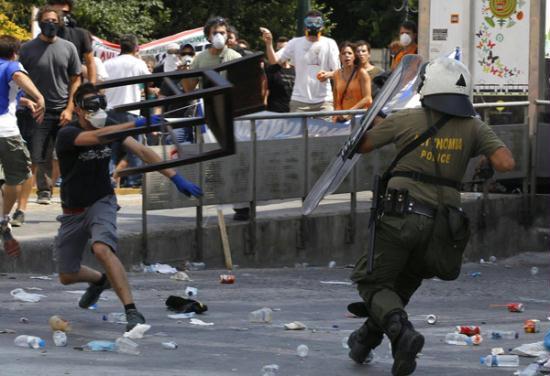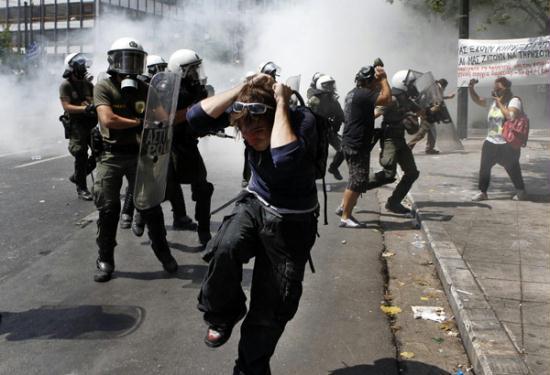| Videos | ? Latest |
|
? Feature | ? Sports | ? Your Videos |
Clash breaks out ahead of Greek parliament vote

 0 Comment(s)
0 Comment(s) Print
Print E-mail
CNTV, June 29, 2011
E-mail
CNTV, June 29, 2011
Greek riot police used tear gas on protestors in Athens as tens of thousands are participating in a massive two-day strike protesting against the austerity measures proposed by the government. Parliament is currently debating the new package of measures ahead of a crucial vote. The story comes courtesy of Reuters.
|
A protester (L) throws a chair at a riot policeman during violent protests against austerity measures in Athens, June 28, 2011. With Greece teetering on the brink of bankruptcy, parliament is due to vote this week on a package of spending cuts, tax increases and privatisations agreed as part of a massive bailout aimed at averting the euro zone's first default. |
Police use tear gas against protestors in Athens.
Tens of thousands are taking part in two-days of strikes and protests in the hope of persuading the government to change its mind about austerity measures.
The parliament is debating a new package of cuts.
Two Greek unions, representing public and private sector workers, have organized the stoppages - hitting transport, schools and hospitals.
"Disobey them." shouts one striker, "The thieves must leave parliament,"
Inside parliament the debate ahead of a crucial vote on the new package goes on.
Greece won't get the next installment of an EU/IMF bailout unless it passes the bill - but many Greeks believe it won't solve anything long-term.
A Greek citizen Anastasios Tsochas said, "They are exhaustive measures that won't be effective. If we thought they would work we might show some patience."
But elsewhere in Europe markets viewed the vote with optimism.
Shares rose and the euro firmed helped - says Frankfurt trader Oliver Roth - by France's agreement to roll over holdings of mature Greek debt.
Roth said, "It's one part of a debt relief for Greece. But what Greece also needs is some structural help from the EU partners to re-invent their economy."
|
Riot policemen disperse protesters during violent protests against austerity measures in Athens' Syntagma (Constitution) square, June 28, 2011. |
The EU has warned Greece it will face immediate default on its 340 billion euro debt pile if it fails to pass the measures and that would hit European banks and possibly trigger a new credit crunch.
Most analysts expect a yes vote.
Kevin Gardiner from Barclays Wealth described the outcome as a "muddle-through situation."
Gardiner said, "It is quite a close call though and the most important investment call that we are making right now is that whatever happens in Greece short-term our belief is that the likelihood of contagion spreading to the rest of the euro zone. We think that risk is manageable and we think that we are going to muddle through the entire crisis without the euro zone falling apart and without the euro zone as a whole moving back into recession."
But there's no chance of Greece escaping recession any time soon.
And some reports suggest the EU is finally working on a plan B in case the vote is lost.







